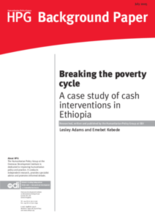This background paper is part of a research project by the Humanitarian Policy Group into the use of cash and vouchers in emergencies. This work seeks to assess the impact of such interventions, and examine the extent to which cash and vouchers – rather than in-kind assistance – are practical, appropriate and cost-effective. It considers the particular implementation challenges inherent in cash interventions, and how these are addressed. The project also investigates attitudes towards cash and vouchers on the part of aid agencies, donors and governments, examining institutional factors which influence the decision to use cash.
The research includes case studies from a number of countries. This case study focuses on Save the Children in Ethiopia, an agency which has been pilot-testing approaches to assessing and addressing livelihood insecurity for many years. The study reviews assistance for populations living in a perpetual state of ‘chronic emergency’– in an environment where many households never make ends meet without external assistance, and where additional households become food insecure when faced with rain failure, conflict, market failure and the like.
©Overseas Development Institute and the Humanitarian Policy Group

